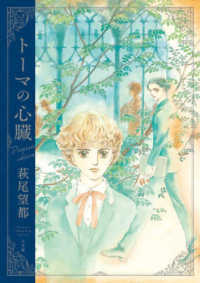基本説明
Kari Weil investigates the rise of animal studies and its singular reading of literature and philosophy through the lens of human-animal relations and diffrence, providing not only a critical introduction to the field but also an appreciation of its thrilling acts of destabilization.
Full Description
Kari Weil provides a critical introduction to the field of animal studies as well as an appreciation of its thrilling acts of destabilization. Examining real and imagined confrontations between human and nonhuman animals, she charts the presumed lines of difference between human beings and other species and the personal, ethical, and political implications of those boundaries. Weil's considerations recast the work of such authors as Kafka, Mann, Woolf, and Coetzee, and such philosophers as Nietzsche, Heidegger, Derrida, Deleuze, Agamben, Cixous, and Hearne, while incorporating the aesthetic perspectives of such visual artists as Bill Viola, Frank Noelker, and Sam Taylor-Wood and the "visual thinking" of the autistic animal scientist Temple Grandin. She addresses theories of pet keeping and domestication; the importance of animal agency; the intersection of animal studies, disability studies, and ethics; and the role of gender, shame, love, and grief in shaping our attitudes toward animals.
Exposing humanism's conception of the human as a biased illusion, and embracing posthumanism's acceptance of human and animal entanglement, Weil unseats the comfortable assumptions of humanist thought and its species-specific distinctions.
Contents
Preface: Thinking Animals Acknowledgments Part I: Why Animal Studies Now? 1. A Report on the Animal Turn 2. Seeing Animals Part II: Pet Tales 3. Is a Pet an Animal? Domestication and Animal Agency 4. Gendered Subjects/Abject Objects: Man(n)'s Best Friend 5. Dog Love/W(o)olf Love Part III: Grieving Animals 6. A Proper Death 7. Thinking and Unthinking Animal Death: Temple Grandin and J. M. Coetzee Part IV: Ethical Betises 8. Animal Liberation or Shameless Freedom "And Toto Too": Animal Studies, Posthumanism, and Oz Notes Index








